Almost 40% of Americans will receive a cancer diagnosis at some point in their lifetime — but certain types are more common than others, statistics show.
USAFacts, a Washington-based nonprofit that compiles government data and reports on it, took a deep dive into the latest cancer data to identify trends — and shared the results with Fox News Digital.
Of the 1.96 million new cancer cases in 2023, half were made up of five types: breast cancer (15%), prostate cancer (15%), lung and bronchus cancer (12%), colorectal cancers (8%) and all other types (50%).
CANCER CAUSES: THESE 10 HIDDEN CARCINOGENS CAN RAISE THE RISK, ACCORDING TO AN ONCOLOGY EXPERT
Among the 609,820 cancer deaths in 2023, nearly half were made up of lung and bronchus cancer (21%), colorectal cancers (9%), pancreatic cancer (8%) and breast cancer (7%).
The remaining 55% of deaths were attributed to other cancers.

Almost 40% of Americans will receive a cancer diagnosis at some point in their lifetime — but certain types are more common than others. USAFacts, a Washington-based nonprofit that compiles government data and reports on it, studied the numbers and shared trends with Fox News Digital. (iStock)
While cancer cases have risen overall due to a growing population, the share of people getting diagnosed and dying from the disease has decreased.
“Between 2000 and 2019, the incidence rate — or the rate of new cancer cases per 100,000 people — declined by 5.4%, while the annual mortality rate fell by more than 26%,” the report stated.
The share of people getting diagnosed and dying from cancer has actually decreased.
“This suggests improvements in cancer prevention, detection and treatment,” Dr. Brett Osborn, a Florida neurologist and longevity expert, told Fox News Digital in a statement.
Osborn was not involved in the report, but commented on the findings.
Here are five standout observations.
1. Gender-specific risk
As of 2019, men were about 15.4% more likely to receive a new cancer diagnosis and 37.5% more likely to die from the disease than women.
That gap has narrowed since 2000, however, when the cancer incidence rate was more than 37% higher for men.
FOODS TO EAT, AND NOT EAT, TO PREVENT CANCER, ACCORDING TO A DOCTOR AND NUTRITIONIST
For men, the most common cancers are prostate, lung and colorectal cancers, the USAFacts report stated.
Those types made up 50.8% of new cancer cases and 45.9% of cancer deaths in 2023 among males.
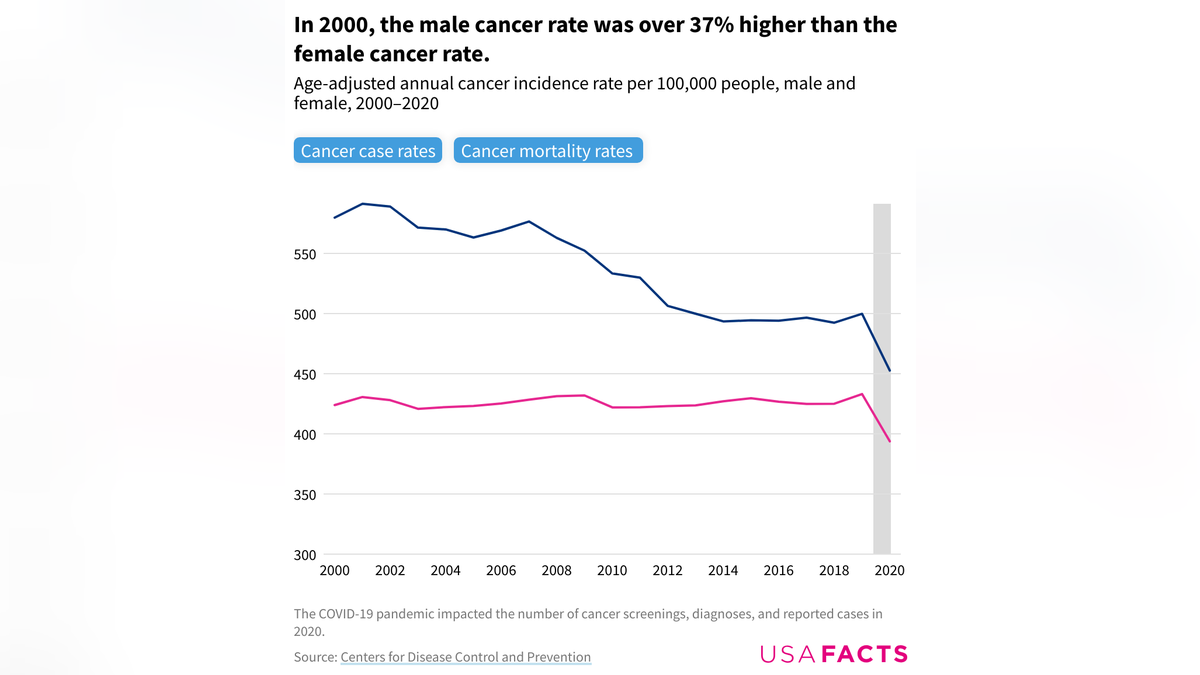
As of 2019, men were about 15.4% more likely to receive a new cancer diagnosis and 37.5% more likely to die from the disease than women. (Centers for Disease Control and Prevention )
Among women, the most prevalent types are breast cancer, lung cancer and colorectal cancer.
Those three types comprised 54.6% of new cancer cases and 50.1% of cancer deaths in 2023 for females.
2. Cancer rates across ethnic groups
White Americans have the highest rate of new cancer diagnoses, followed by non-Hispanic Black Americans, the report stated.
Among cancer deaths, however, non-Hispanic Black Americans are at the highest risk.
SOME BREAST CANCER PATIENTS COULD BE AT RISK OF ANOTHER TYPE OF CANCER, STUDY REVEALS
Non-Hispanic Asian/Pacific Islander Americans have the lowest risk of diagnosis and mortality.
Overall cancer incidence rates have dropped between 2000 and 2019 for every group except American Indian/Alaska Native people, who experienced a nearly 35% increase in diagnoses.
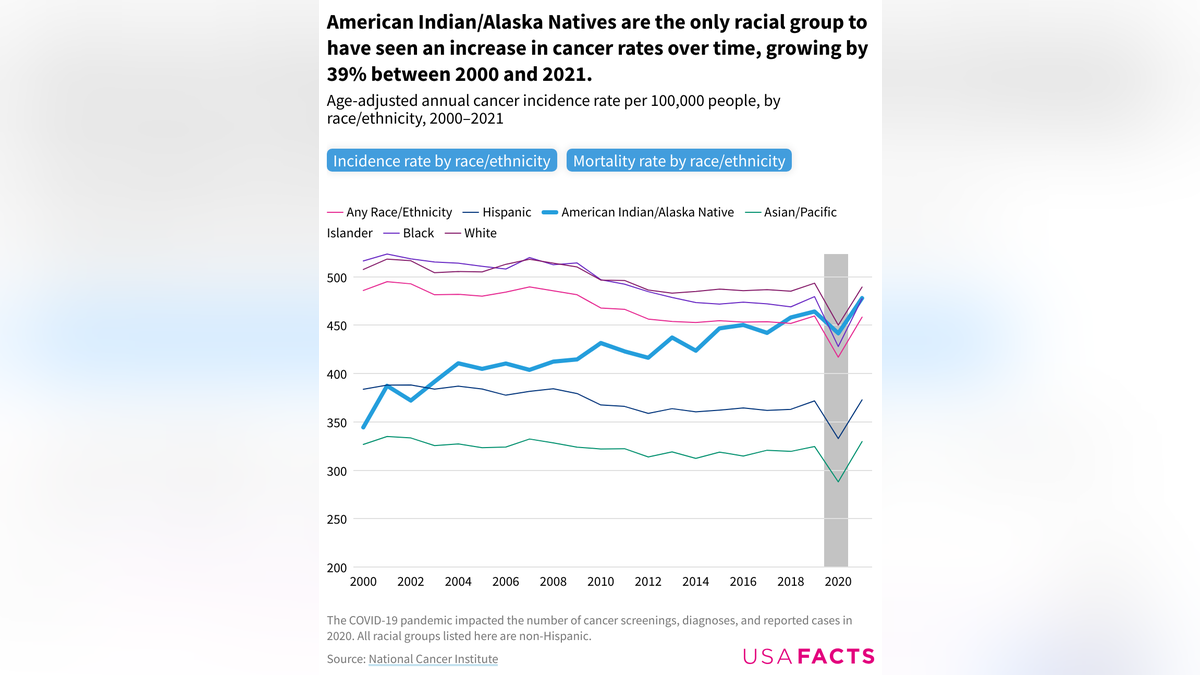
White Americans have the highest rate of new cancer diagnoses, followed by non-Hispanic Black Americans, the report stated. (National Cancer Institute)
“While the reason behind these disparities is hard to pin down, contributing factors include access to health care, environmental conditions, lifestyle behaviors and genetics,” the report states.
3. Cancer survival rates
The five-year cancer survival rate has risen, going from 63.5% in 2000 to 68.4% in 2015 — and is expected to continue its upward trend.
“This improvement is credited to better prevention, early detection and advancements in treatment,” according to Osborn.
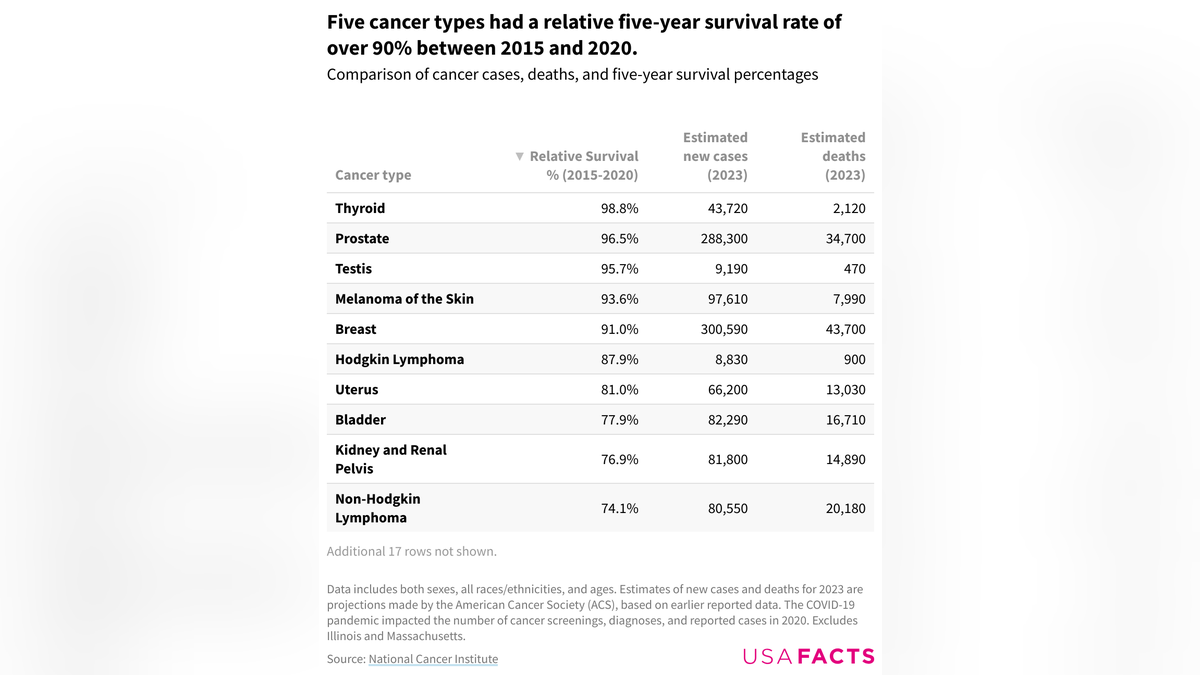
The five-year cancer survival rate has risen, going from 63.5% in 2000 to 68.4% in 2015, and is expected to continue its upward trend. (National Cancer Institute)
Survival rates vary by cancer type.
The cancers with the highest five-year survival rate are thyroid (98.8%), prostate cancer (96.5%), testicular cancer (95.7%), skin cancer (93.6%) and breast cancer (91.0%).
CANCER RATES RISING IN YOUNG PEOPLE DUE TO ‘ACCELERATED AGING,’ NEW STUDY FINDS: ‘HIGHLY TROUBLING’
“It should be noted that estimated cancer deaths in 2023 do not reflect the five-year survival rate between 2015 and 2020, as deaths in 2023 may result from cancer cases diagnosed prior to the five-year window,” the report stated.
4. Average age of cancer diagnosis
Age is the most prevalent risk factor for a cancer diagnosis, according to the report.
Diagnosis rates rise steadily for each decade of life.
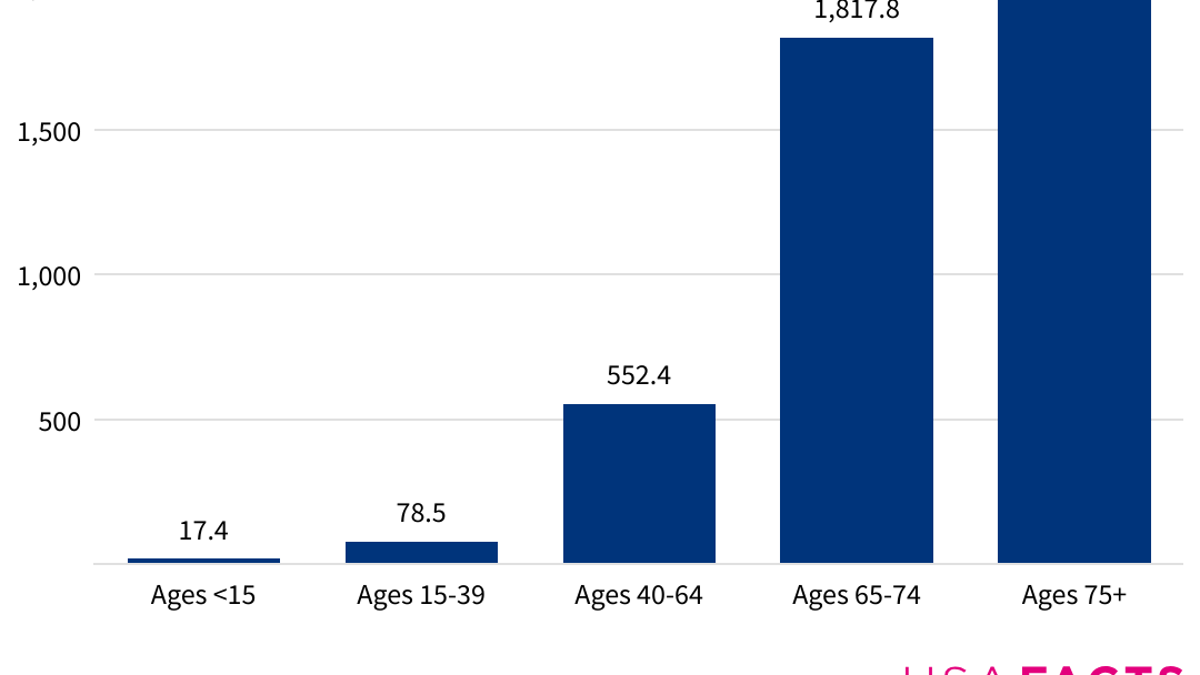
Age is the most prevalent risk factor for a cancer diagnosis, according to the new report. (National Cancer Institute)
The average age of diagnosis is 66 and the average age of death is 72, according to data gathered by the National Cancer Institute (NCI) between 2016 and 2020.
The disease can occur at any age, however — which is why experts recommend early screenings to reduce mortality rates.
5. Importance of guarding against ‘complacency’
Despite the improvements in cancer incidence and mortality rates, Osborn warned that Americans “should not be lulled into complacency.”
CLICK HERE TO SIGN UP FOR OUR HEALTH NEWSLETTER
“According to 2024 data from the American Cancer Society, the incidence of six of the most common cancers – namely those related to excess body weight, such as endometrial, liver, kidney, pancreas, colorectal and breast – are on the rise and may temper the declining mortality rate in the future,” he warned.
Rising obesity rates in the U.S. are a direct cancer driver, Osborn indicated.
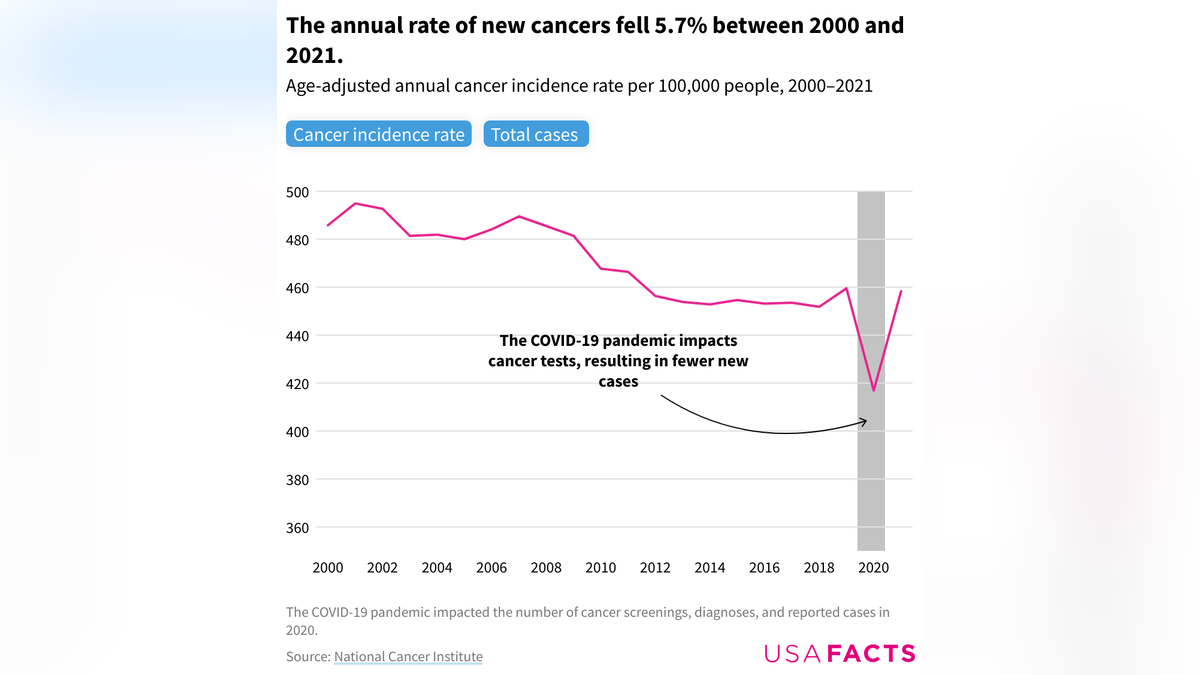
While cancer cases have risen overall due to a growing population, the share of people getting diagnosed and dying from the disease has decreased. (National Cancer Institute)
“It is estimated that more than two in five adults (42.4%) have obesity – a gateway disease to cancer — according to recent data from the National Institute of Diabetes and Digestive and Kidney Diseases,” said Osborn.
“One can only hope that we are not headed in the wrong direction.”
“Unless the tide is turned and the obesity epidemic is addressed, the observed reduction in the annual rate of new cancers and associated mortality will slow and potentially be extinguished,” he continued.
CLICK HERE TO GET THE FOX NEWS APP
“One can only hope that we are not headed in the wrong direction.”
USAFacts compiled its report using data from the NCI, the U.S. Centers for Disease Control and Prevention (CDC) and the National Center for Health Statistics (NCHS).
For more Health articles, visit www.foxnews.com/health.






